Every community has them. Folks that radiate a particular kind of joy that only can come from a life imbued with meaning. They’re from different generations, races, economic levels. What they have in common is the belief that the lasting transformation begins with relationships, an inch wide, a mile deep.
We shined a light on 12 social fabric weavers from one community, our hometown of Phoenixville, PA: Meet Beth who began donating leftover food from her restaurant to a shelter and ended up being elected for city council. Meet Theresa who channeled the weight of caring for her sick mother into movement celebrating caregivers.
The weavers remind us that the world we’re waiting for can start right here. Right now. Stronger, more resilient neighborhoods depend on us getting engaged and caring for one another. May these stories inspire you to seek out, to celebrate, and to become the weavers we’ve been waiting for.
Day Seven: Maddie Goodwin
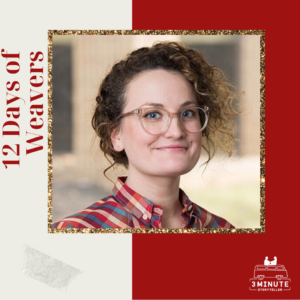
The 2017 @womensmarch aimed to start a movement of women from all walks of life who would continue their activism long after they had gone home. Maddie Goodwin of Phoenixville, PA left the March unsure how to translate her energy into local action.
Ms. Goodwin began by reaching out to The House, which provides transitional housing for homeless women in Phoenixville and “bought a bunch of stuff off their wish list.”
The windfall caught the attention of employee Cailin Coolbaugh. Over coffee, they discovered a shared passion for social healing. With Maddie’s marketing background with Calin’s non-profit experience they were uniquely poised to help others who wanted to get involved but didn’t how.
In that moment, @pxvgives PXV Gives was born. “Our mission,” Ms. Goodwin explains, “is to inform the community about the work local organizations do and make it easier for residents to get involved with the vast array of non-profits that share their values.”
Honoring what had been ignited inside her from The Women’s March challenged Maddie to break out of her comfort zone. “I’ve just always loved the idea of being part of a real community,” shares Maddie. “I wanted to be able to be an active participant instead of a passive one.”
It can be challenging to put yourself out there, but Maddie say she’s been richly rewarded. “I now get to discover an entirely new side of the town I love. We’ve met such amazing, curious people who want to get involved. I think we all get the same satisfaction—doing our part to make this the town we love to live in.”
By dutifully tending to her corner of the world, Ms. Goodwin not only realized her dream by knitting herself into the fabric of her community, but she built a platform so that others can too.
Day Eight: Julie Miller
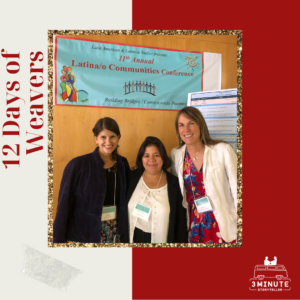
A book can open us up to so much more than the story inside.
“A mom of one my students who had recently arrived here from Guatemala came in to be a guest reader,” Julie Miller, English as a Second Language Teacher at Phoenixville Learning Center recalls. “After she read the book in Spanish, we asked her what her favorite books growing up were. She said that in Guatemala as a little girl, she didn’t own any books. She relied on her mother telling her stories, but they had no books at all.” Ms. Miller noticed her Spanish-speaking students were checking out books at the school library and were bringing them back unread. No one at home could read them the books because they didn’t read in English. She wrote a grant to purchase new books, “and the Spanish library was born!”
Working so closely with the immigrant community, Ms. Miller finds herself acting as a bridge between different worlds. “I really want folks to know that the immigrant experience can be painful and traumatic, but families are willing to take these risks and make these sacrifices because there is no future in their home countries. No prospect of a solid education, a job, or the ability to prosper,” Ms. Miller says. “Here, there is hope. There is education. There are jobs.”
If you create opportunities for neighbors to get to know each other, they begin to care for each other. Ms. Miller has learned that intentional proximity is the first step towards social healing. And nothing shrinks the distance between us like books.
Last year, Julie’s class collaborated with Natalie Hyrnko’s middle school class. Soon the middle schoolers realized that Ms. Miller’s students didn’t have books at home. During their last visit, the older students announced that the books were gifts for Ms. Miller’s students to keep. Ms. Hyrnko had written a grant for books donations as a surprise for Julie and her class. “It was beyond heartwarming,” remembers Julie.
Day Nine: Teresa Haag
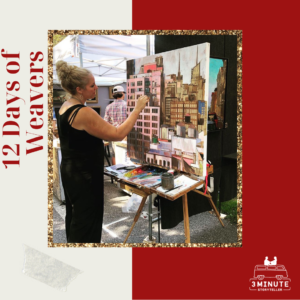
Phoenixville’s revitalization is inextricably interconnected with community art. Art spurred its evolution, and its evolution was nourished by art. As storefronts began to fill, new planters overflowing with flowers were installed along the streets As new residents began inhabiting downtown apartments, murals began cropping up on the sides of buildings.
For Teresa Haag, artist and owner of the eponymously named Studio and Gallery, public art is mirror that helps a community grow in the right direction. Towards goodness and light.
The stunning murals adorning Phoenixville’s most iconic buildings were painted by Ms. Haag. Over the weeks it takes to paint a mural, Teresa becomes a fixture in the neighborhood. Residents often stop by and share stories of their lives. “The stories center around family and community,” she says. “Art inspires those memories for people.” Her new studio invigorates the collective imagination of what’s possible in our lives together. “Art is best experienced with others, since it has the uncanny ability to connect people,” Ms. Haag says. “In the studio I want people to feel like they are being hugged when they walk in the door.” Community offers the promise of belonging and insists that we acknowledge our interdependence. It’s against this backdrop that Teresa gifts as a connector, and her studio as a place of generous hospitality, shine. Volunteers recently congregated in the studio to fill backpacks for foster children.
It’s the rare artist indeedwho inspires us through the challenging beauty of her creation, then is able to accompany us as we co-create the story of our belonging. “I like to think that Phoenixville is a beacon for those that need it most,” Ms. Haag reflects. “A place that everyone is welcomed with open arms. I never understood how important community was until I found it here.”
Day Ten: Aaron Kern
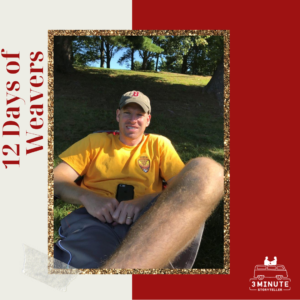
Aaron and his wife Janelle Kern started the Chili Cook-Off when they first moved to the neighborhood. “We thought, what a great way to meet people. Soon, we invited the entire neighborhood,” Mr. Kern remembers.
Like any self-respecting tradition, there are rules.Chili must stand on its own and can’t be judged with condiments like cheese or sour cream. Every chili needs a name, and some are more PG than others.
By late morning on the chosen Saturday, families begin pouring down the street wielding folding tables, crock pots, and coolers. As the sun begins to set, the voting begins.
Towering trophies, in hand, Mr. Kern announces the winners.
While the Chili Cook-Off was envisioned to strengthen neighborly ties, the Kerns always invited Aaron’s hometown buddies from Hanover, a small town in central PA, and their families. “I am extremely fortunate to have some close friends who I have known since I was four years old. That is rare,” Aaron says.
The added dynamic of the Hanover crew, I suspect, was the critical yeast that helped the Weyhill neighborhood coalesce. •
These guys are a fiercely loyal bunch. Their humor and devotion had a gravitational pull that drew us all in.
In the internet age, we’re learning that place matters more than we ever realized. What’s your Chili Cook-Off? Perhaps it’s an annual block party, a holiday potluck.
Inevitably when people live in community, tensions arise. Events like these are a neutralizing force. A social lubricant that mends the fraying edges of our lives together.
The key is that everyone is invited. It’s an implicit understanding that at a time when isolation is on the rise, and many don’t know their neighbor’s names, we show up for each other.
Understanding nourishes belonging. And all any of us are really searching for is our place to belong.
For those of us who understand the value of place, who believe that isolation isn’t inevitable, how can we, inspired by Aaron, gather together stem the tide of despair?
Day Eleven: Nora Minassian
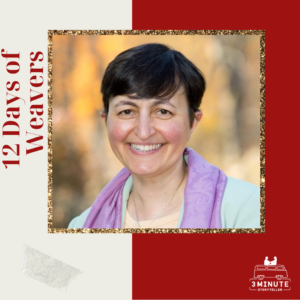
Most doctor’s visits begin with the opening of a laptop dutifully recording patient’s ailments to report to the insurance company.
Instead of looking into their patients’ eyes, they type into a screen. It’s a tiny dehumanizing practice of our healthcare system.
For Nora Minassian, there is a different way. It’s called Carah Medical Arts, a new paradigm for healthcare and healing where she is a board member, educator, and supporter. “[Carah] gives the doctors the freedom to take time with the patients. This listening and understanding is an important part of the healing process,” Ms. Minassian explains. Carah was born from the belief that we need to create the kind of healthcare we want. Waiting for politics and the healthcare industry to fix it will not get us there.
A new kind of medicine that combines vigorous science with empathy and creativity requires a new economic model. Carah is based on the economics of caring for each other.
It frees doctors to practice medicine as they best deem necessary. It frees patients to receive care that takes into account their full humanity. It frees the community to create for themselves a healthcare system based on mutual care. This kind of freedom, contrary to the popular culture notion, is not an escape from accountability. Accepting the choice to be a creator of our own lives is to accept the considerable responsibility of freedom, a freedom that is an act of love.
For Nora, the transformational impact of Carah is clear. “The touching moment for me,” she says, “is when I meet people in community and in the middle of a conversation, suddenly they tell me that they had a certain illness for years or their child had a certain difficulty that they had tried so many things and nothing had helped. After one session with the physicians, like a light at the end of a tunnel, they experienced the beginning of healing or that their child is free of the ailment.” Undergirding her work is the sense that our freedom lies not when we are absolved from any responsibility to each other, but, paradoxically, when we nurture the invisible web that connects us all.
Day Twelve: Gary Russell
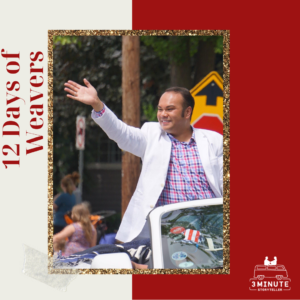
A typical day for Phoenixville, PA Mayor Peter Urscheler might include attending a breakfast to issue a proclamation, delivering a quick speech at a ribbon cutting, capped off with emceeing bingo night at the Senior Center. In between, he’s squeezing in calls from clients from his other job as a marketing consultant; the job that pays his bills.
But what’s most impressive about Peter isn’t his tireless devotion to his community, it’s the inexhaustible wellspring of goodness that flows through him. Walking through town, Mayor Urscheler gets stopped like a rock star. Residents want a selfie, a hug, a moment of his attention. He’s as equally effusive and present with each person.
Peter is the only child, born to his immigrant parents who raised their son to serve the common good. From his first breath, Peter was bathed in unconditional love by his parents. This love is a living legacy that circulates through him,flowing ever stronger with each interaction and each passing day. It’s love that continues to fuel him.
Mayor Urscheler was named one of the Nation’s Ten Outstanding Young Americans for 2019. Past honorees include Arthur Ashe, Bill Clinton, John F. Kennedy, and Elvis Presley.
When asked about his years of public service, Peter says, “I can lay no claim to any accomplishment that has been ascribed to me throughout my life, only gratitude that my life reflects the extraordinary people within it, that my life is a reflection of all of you [the Phoenixville community].”
Just as @purscheler is a vessel to circulate love wherever he goes, so too is he a mirror reflecting our highest and best selves back to us. It’s not really about him, he’d tell you. He’s just open enough to reflect back to you what’s possible inside you.
A prophet of beloved community.
And our soul feels its worth.
Mayor Urscheler offers us a roadmap for building a future worthy of our children. It’s a new model of leadership, reminding us we’re made from love, for love. Leadership that never stops fighting for what is right and just.
Leadership that makes goodness irresistible.





Comments (0)
Have no comment.